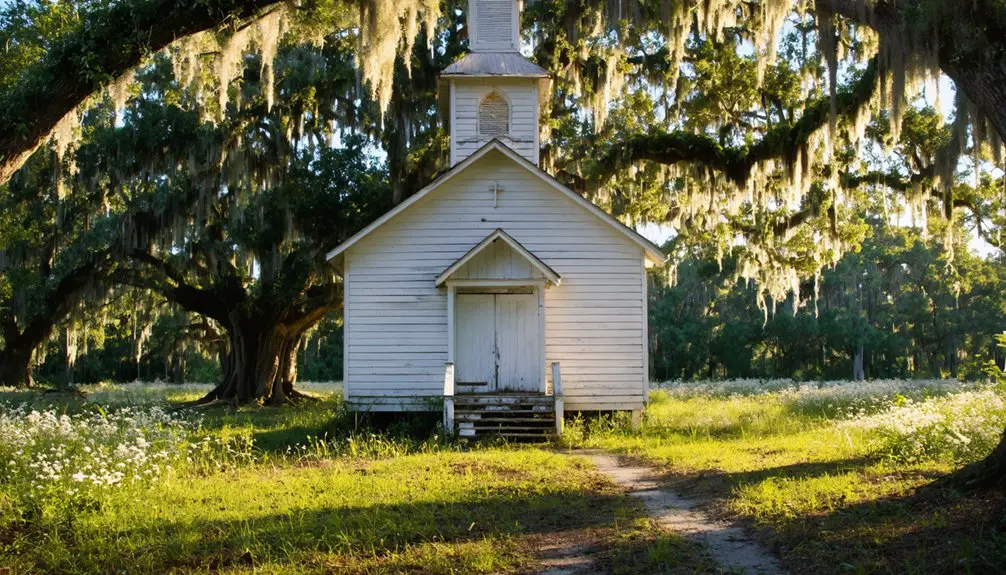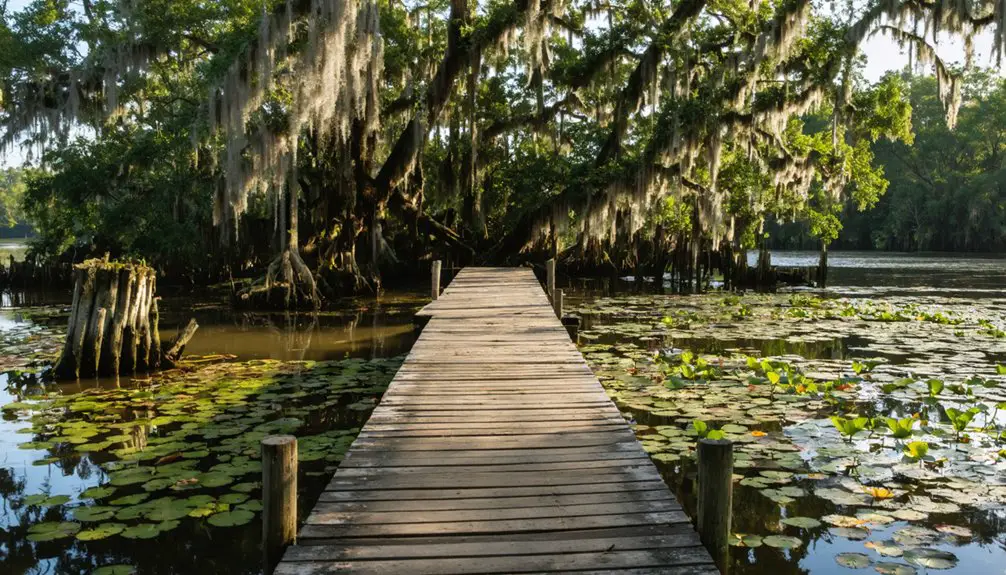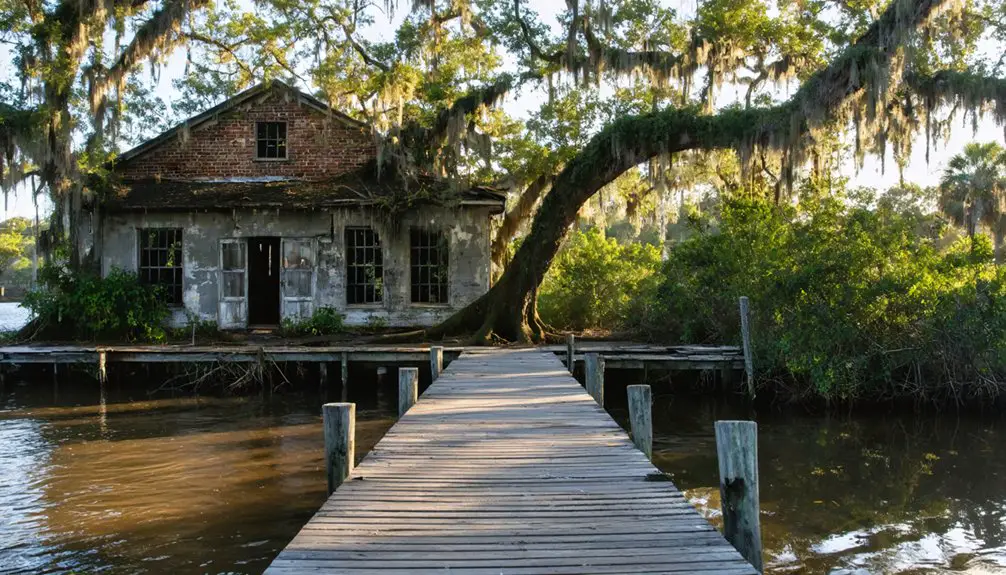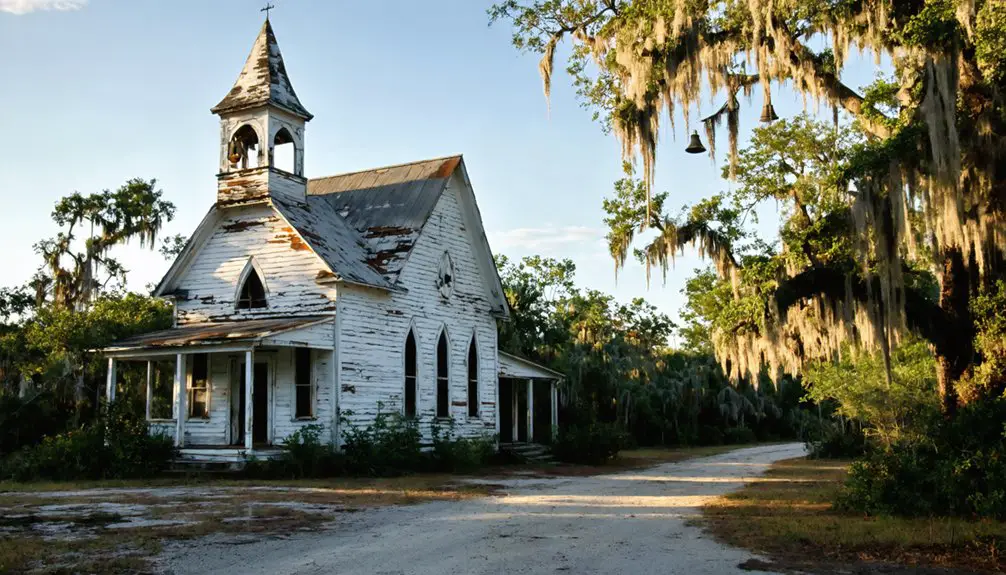You’ll discover Green Pond nestled in Polk County, Florida, where A.T. Williams established this agricultural settlement in 1879. While the community once thrived on citrus farming and centered around the historic Green Pond Baptist Church, built in 1890, it’s now largely reclaimed by nature. The ghost town‘s deteriorating structures and isolated location tell a compelling story of Florida’s frontier past, with the Green Pond Cemetery’s weathered headstones guarding generations of untold pioneer tales.
Key Takeaways
- Green Pond was established in 1879 as an agricultural community in Polk County, Florida, centered around citrus cultivation and farming.
- The community declined when the South Florida Railroad’s 1884 arrival boosted nearby towns but bypassed Green Pond.
- Nature has reclaimed much of the settlement, with saw palmettos and scrub pines overtaking previously inhabited areas.
- The Green Pond Cemetery and Baptist Church remain as primary historical sites, serving as remnants of the former community.
- Isolation from modern highways and lack of infrastructure maintenance have contributed to Green Pond’s current ghost town status.
Origins and Early Settlement
While many Florida settlements emerged during the post-Civil War expansion, Green Pond‘s story began in 1879 as pioneers established a small agricultural community in Polk County near the Green Swamp region.
The early inhabitants recognized the area’s potential for citrus cultivation, taking advantage of the fertile soil along Green Pond Road and Rock Ridge Road. Like other pioneer settlements that experienced boom-bust cycles, Green Pond’s early prosperity depended heavily on the success of its agricultural ventures. You’ll find that settlement patterns centered around the establishment of citrus groves, with farmers building homes and agricultural structures to support their operations. The Green Pond Cemetery stands as a testament to the community’s early roots, with some gravestones dating back to the 1850s.
The community’s spiritual foundation was cemented in 1890 with the construction of Green Pond Baptist Church, which quickly became the heart of local social life.
As the settlement grew, it positioned itself as a modest but viable agricultural hub within Polk County’s expanding farming landscape.
Native American Connections
Long before European settlers established Green Pond, the Seminole Indians and their predecessors inhabited this rich ecological zone for thousands of years, with archaeological evidence dating back to 6000 B.C.
The area’s Native American cultural impact remains evident through discoveries of pottery shards, burial mounds, and ancient campsites.
Ancient peoples were drawn to the region for its abundant plant and animal life which provided sustenance through hunting and gathering activities.
You’ll find traces of their resourceful lifestyle through:
- Traditional chickee dwellings that dotted the landscape
- Strategic hideouts used during the Second Seminole War
- Sacred ceremonial grounds where Green Corn Dances occurred
- Ancient pottery fragments showcasing artistic traditions
- Burial mounds revealing complex social structures
During the Second Seminole War (1835-1842), warriors used Green Pond’s dense swamps for guerrilla warfare against U.S. forces.
The Armed Occupation Act of 1842 later forced most remaining Seminoles from their ancestral lands, though some persisted in small camps into the early 1900s.
The Seminole leader Chief Chipco was known for maintaining peaceful relations with white settlers while preserving his people’s traditions.
The Rise of Green Pond Community
In 1879, settler A.T. Williams established Green Pond, naming it after his South Carolina hometown. You’ll find that community growth started with pioneering families like the Judys, who arrived in 1867. William Judy and his son married Cherokee women, setting a precedent for the area’s cultural blending.
Settlement patterns centered around the Green Pond Baptist Church, founded in 1890. You’ll notice how the church, along with one-room schools, became essential gathering points for early residents. Today, this historical location requires disambiguation page guidance for visitors researching its past.
While the South Florida Railroad‘s 1884 arrival boosted nearby towns, Green Pond’s position near Green Swamp limited its expansion. Despite this, the community thrived through agriculture, particularly citrus farming. The surviving grove barn stands as evidence to the agricultural foundation that shaped this rural settlement’s identity.
Agricultural Legacy and Citrus Industry
As Spanish explorers first introduced citrus to Florida in the early 1500s, Green Pond’s agricultural destiny began taking shape through generations of determined farmers. Ponce de León himself helped establish this legacy by bringing the first citrus trees to the region.
You’ll find that citrus cultivation played a significant role in the region’s development, mirroring Florida’s broader agricultural evolution from wild seedlings to commercial enterprises. By 1950, the industry had grown to harvest 100 million boxes annually.
- Horse-drawn wagons transported precious citrus cargo up to 60 miles to reach enthusiastic markets.
- Local growers grafted wild orange seedlings to create sweeter, more profitable varieties.
- Farmers battled devastating freezes that pushed operations further south.
- Railroad expansion opened new opportunities for shipping to northern states.
- The economic impact rippled through the community as citrus farming industrialized.
Like many Florida communities, Green Pond’s farmers adapted to environmental challenges while contributing to the state’s emergence as a global citrus powerhouse.
Historical Landmarks and Structures
While citrus groves once dominated Green Pond’s landscape, today you’ll find a different kind of historical footprint through the area’s surviving landmarks and structures.
The cemetery significance is evident at Green Pond Cemetery, established in 1879, where you can trace the community’s roots through gravesites dating back to 1856. A prominent statue bears the inscription Let us not forget those who came before us as a testament to the early settlers. The cemetery serves as a final resting place for many notable pioneer families, including the Judys, Meeks, Raulersons, and Hancocks.
Green Pond Cemetery stands as a stone-etched timeline, its weathered markers chronicling local history since before the Civil War.
Along Green Pond Road, you’ll discover scattered “cracker homes” showcasing the architectural styles of early Florida pioneers, though many now stand in various states of preservation.
The Old Grove Barn remains as a reflection of the area’s agricultural heritage, while the former site of Green Pond Baptist Church, founded in 1890, marks where the community once gathered.
Though formal historical markers are few, these surviving structures tell the story of this vanished town.
The Transformation Into a Ghost Town
Once a thriving agricultural community, Green Pond’s transformation into a ghost town began with the devastating citrus freeze of 1894-95 that crippled the local economy.
The community decline accelerated as economic shifts forced families to seek opportunities elsewhere, leaving behind their farms and homesteads. Similar to the decline seen when the Consolidated Naval Stores relocated from High Coria in 1929, the exodus marked a turning point for the area.
You’ll find traces of this transformation in:
- Abandoned “cracker homes” slowly reclaimed by native vegetation
- Unmarked graves in the cemetery, telling stories of departed families
- Overgrown citrus groves surrendering to saw palmettos and scrub pines
- Deteriorating infrastructure from lack of maintenance and coastal air
- Former transportation routes now redirected to favor nearby towns
Nature has steadily reclaimed what humans left behind, as Green Pond’s isolation from modern highways and lack of redevelopment sealed its fate as a ghost town.
Preserving Green Pond’s Heritage

Despite the physical deterioration of Green Pond’s structures, dedicated preservation efforts focus on protecting the community’s heritage through its cemetery, historical documentation, and family legacies.
You’ll find the Green Pond Cemetery, established in 1879, serving as the primary historic site where pioneer families like the Raulersons, Bridges, and Judys rest.
Heritage documentation efforts include partnerships between local history centers and preservation groups, while community engagement comes through genealogical research and oral histories.
The Florida Trust for Historic Preservation supports these initiatives, though they face challenges in a state traditionally focused on development.
Digital preservation through photographs, videos, and online databases helps maintain Green Pond’s memory, while cemetery records and family histories provide essential links to the past.
Frequently Asked Questions
What Caused the Sudden Decline of Green Pond’s Population in Modern Times?
You’ll find economic downturns hit hardest when citrus freezes destroyed farms, while population migration accelerated as younger residents left for urban opportunities, leaving behind aging communities with dwindling resources and poor infrastructure.
Are There Any Surviving Photographs of Green Pond During Its Peak Years?
You won’t find any confirmed historic documentation or photographic evidence from Green Pond’s peak years. Modern photos exist only of remaining structures like a grove barn and cemetery from 2015.
What Wildlife Species Can Be Found in Green Pond Today?
To sum it up, you’ll find amazing ecological diversity at Green Pond today, from endangered snail kites to white-tailed deer, river otters, alligators, and over 250 bird species.
How Accessible Is Green Pond Cemetery to the General Public?
You’ll find Green Pond Cemetery readily accessible via Greenpond Church Road, with public visitation generally permitted. Since it’s on church grounds, you’re free to visit during daylight hours, respecting any services.
What Happened to the Original Green Pond Baptist Church Building?
You’ll find that the original 1859 church building was demolished after the congregation moved to a new sanctuary in 1957, with no restoration attempted to preserve this piece of church history.
References
- https://www.youtube.com/watch?v=DBFWB4tEVOs
- https://en.wikipedia.org/wiki/Green_Pond
- https://floridatrailblazer.com/2015/07/20/roadside-history-ghost-town-of-green-pond-old-grove-barn/
- https://floridatrailblazer.com/2015/07/
- http://www.gribblenation.org/2018/09/florida-friday-rock-ridge-road-and.html
- https://www.journaloffloridastudies.org/0102ghosttowns.html
- https://www.fivay.org/chipco.html
- https://www.swfwmd.state.fl.us/watersheds/green-swamp/history
- https://www.suwgov.org/history/
- https://files.floridados.gov/media/32346/nativeamericanheritagetrail.pdf



